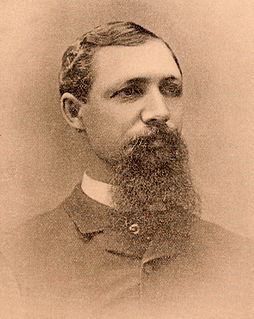A Quote by Martin Luther
The Deceiver can magnify a little sin for the purpose of causing one to worry, torture, and kill oneself with it. This is why a Christian should learn not to let anyone easily create an evil conscience in him. Rather let him say, "This error and this failing pass away with my other imperfections and sins, which I must include in the article of faith: I believe in the forgiveness of sins.
Quote Topics
Related Quotes
To free a man from suffering, he must be set right, put in health; and the health at the root of man's being, his rightness, is to be free from wrongness, that is, from sin. A man is right when there is no wrong in him. I do not mean set free from the sins he has done: that will follow; I mean the sins he is doing, or is capable of doing; the sins in his being which spoil his nature — the wrongness in him — the evil he consents to; the sin he is, which makes him do the sin he does.
A little thorn may cause much suffering. A little cloud may hide the sun. Little foxes spoil the vines; and little sins do mischief to the tender heart. These little sins burrow in the soul, and make it so full of that which is hateful to Christ, that he will hold no comfortable fellowship and communion with us. A great sin cannot destroy a Christian, but a little sin can make him miserable.
We are saved from nothing if we are not saved from sin. Little sins are pioneers of hell. The backslider begins with what he foolishly considers trifling with little sins. There are no little sins. There was a time when all the evil that has existed in the world was comprehended in one sinful thought of our first parent; and all the now evil is the numerous and horrid progeny of one little sin.
We are not to look upon our sins as insignificant trifles. On the other hand, we are not to regard them as so terrible that we must despair. Learn to believe that Christ was given, not for picayune and imaginary transgressions, but for mountainous sins; not for one or two, but for all; not for sins that can be discarded, but for sins that are stubbornly ingrained.
Our justification from sins takes place at the point of saving faith, not at the point of water baptism, which usually occurs later. But if a person is already justified and has sins forgiven eternally at the point of saving faith, then baptism is not necessary for forgiveness of sins nor for the bestowal of new spiritual life. Baptism, then, is not necessary for salvation. But it is necessary if we are to be obedient to Christ, for he commanded baptism for all who believe in him.
This doctrine of forgiveness of sin is a premium on crime. Forgive us our sins means Let us continue in our iniquity. It is one of the most pernicious of doctrines, and one of the most fruitful sources of immorality. It has been the chief cause of making Christian nations the most immoral of nations. In teaching this doctrine Christ committed a sin for which his death did not atone, and which can never be forgiven. There is no forgiveness of sin. Every cause has its effect; every sinner must suffer the consequences of his sins.
Do not be irritated either with those who sin or those who offend; do not have a passion for noticing every sin in your neighbour, and for judging him, as we are in the habit of doing. Everyone shall give an answer to God for himself. Everyone has a conscience; everyone hears God's Word, and knows God's Will either from books or from conversation with other people. Especially do not look with evil intention upon the sins of your elders, which do not regard you; "to his own master he standeth or falleth." Correct your own sins, amend your own life.
May a merciful God preserve me from a Christian Church in which everyone is a saint! I want to be and remain in the church and little flock of the fainthearted, the feeble and the ailing, who feel and recognize the wretchedness of their sins, who sigh and cry to God incessantly for comfort and help, who believe in the forgiveness of sins.
Do not regard the feelings of a person who speaks to you about his neighbor disparagingly, but rather say to him: "Stop, brother! I fall into graver sins every day, so how can I criticize him? In this way you will achieve two things; you will heal yourself and your neighbor with one plaster. This is one of the shortest ways to the forgiveness of sins; I mean, not to judge. `Judge not, and ye shall not be judged."
If, in the case of the worst sinners and those who formerly sinned much against God, when afterwards they believe, the remission of their sins is granted and no one is held back from baptism and grace, how much more, then, should an infant not be held back, who, having but recently been born, has done no sin, except that, born of the flesh according to Adam, he has contracted the contagion of that old death from his first being born. For this very reason does he [an infant] approach more easily to receive the remission of sins: because the sins forgiven him are not his own but those of another







































